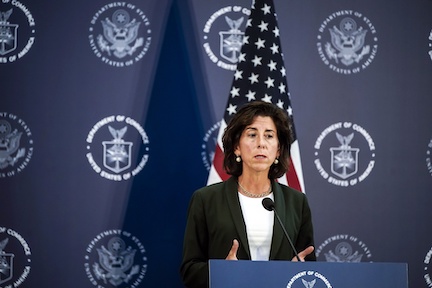US Commerce Secretary Gina Raimondo warned that Chinese-made electric vehicles pose significant national security risks, as the Biden administration weighs additional tariffs on autos from the Asian country as well as a separate measure to protect Americans’ personal information.
Electric and autonomous vehicles are “collecting a huge amount of information about the driver, the location of the vehicle, the surroundings of the vehicle,” Raimondo said during an Atlantic Council fireside chat on Tuesday. “Do we want all that data going to Beijing?”

Her remarks come as the White House is preparing an executive order to prevent foreign adversaries from accessing “highly sensitive” individual data, as Bloomberg News reported last week. US officials have long warned that China poses a particular threat in that area, and the new measures could affect a wide array of industries.
A Commerce Department official said that Raimondo’s comments on Tuesday were not tied to that executive order. Rather, they reflected additional technology areas on which the commerce chief is increasingly focused from a national security perspective, the official said, declining to be named to discuss internal conversations.
Raimondo’s tone underscores the scope of the technology battle between the US and China, as Washington scrutinizes sectors that have long posed economic competitiveness concerns increasingly through the lenses of national security and statecraft.
Two prominent examples are electric vehicles and computing chips. Washington has worked to cut Beijing off from the most advanced semiconductor technology, but officials worry about China’s overcapacity in older-generation chips that are essential to the global economy.
Raimondo on Tuesday drew a distinct parallel between the two sectors: “You can ask the same questions about semiconductors, many of which are made in China,” she said.
National Security Advisor Jake Sullivan reiterated US concerns in a speech to the Council on Foreign Relations on Tuesday night. “We’ve also worked hard to ensure that advanced and sensitive technologies our companies are developing do not become a source of vulnerability,” Sullivan said.
Beyond national security, market concerns still weigh heavily. The Biden administration has poured billions of dollars into subsidizing domestic production of both EVs and semiconductors, and is looking at trade tools to help protect that growing manufacturing base.
The White House is currently deciding whether to increase duties on certain Chinese imports including EVs, following a years-long review of tariffs first imposed under President Donald Trump. Cars from Chinese automakers like BYD Co. have made inroads in Europe and Latin America, but haven’t yet entered the American market in part because of a 27.5% US tariff.
On the chips front, the Commerce Department is surveying semiconductor customers — which include automakers and all the biggest tech firms — to understand how they source less-advanced electronic components, with an eye toward potential tariffs.

Follow us on social media: